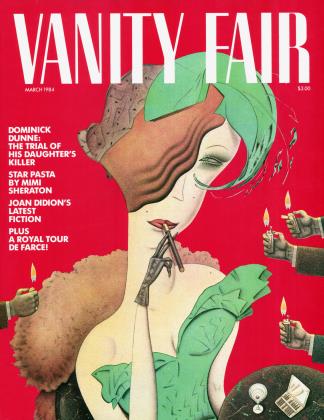Sign In to Your Account
Subscribers have complete access to the archive.
Sign In Not a Subscriber?Join NowHIGH DUDGEON
Naples: drama is legal tender
GOING OUT IN
WILLIAM WEAVER
When I think of Naples I remember it as a warm, sunny place, though I spent there the coldest months of my life, the dramatic wartime winter of 1943. Neapolitans too believe their city is always temperate: there are seldom radiators in the rooms, and the windows admit more air than they close out. On cold days you are better off outside.
For that matter, Naples is a city to be out in. The people are as at home in their streets as in their houses. Wander along the vicoli, the narrow alleys running off the main thoroughfares, the Via Roma, the Rettifilo, and you will see whole families huddled around fires burning in rusty braziers. You can buy food—or less innocent merchandise—in the streets, and you can usually witness some human drama, a quarrel, a bargain laboriously achieved, a funeral, a wedding pair tootling by in a car bedecked with strips of white crepe paper.
Neapolitans don't live their lives, they enact them. My landlady used to have a regular morning screaming fight with her maid-of-all-work, who screamed back even more shrilly until in the end one of the women would flounce out of the house. Lunch would then be prepared, served, eaten in serenity. I realized that the yelling was a kind of daily calisthenics for the two of them. Debating a taxi fare can be equally ritualized and theatrical. Once, when I was complaining about a charge I considered excessive, I hit upon a magic phrase: "V» vulete fafess'a me?" (Are you trying to make a fool of me?) The driver thought I was accusing him not of dishonesty but, more gravely, of discourtesy. He promptly lowered his demand (and, with it, the number of starving children he had adduced as his justification). Deferentially, he helped me from the cab, earning a tip that more than made up for the discount conceded.
"Think of Naples as a happening. Accept what comes. Expect the unexpected." This was my advice recently to a Japanese friend as we were arriving from Rome for his first visit. Outside the station my words proved prophetic. We grabbed the last taxi; I gave the name of our hotel. Seeing my companion, the Neapolitan driver smiled cordially—and greeted him with a flood of idiomatic Japanese. He had worked for ten years in a Japanese restaurant in Milan and, with characteristic Neapolitan skill, had picked up the language I had long been studying in vain.
Starving children, by the way, may be a taxi driver's ploy, but they are also a reality. Hunger is a condition of Naples the way cold is a condition of Stockholm, or canals of Venice. It's significant that calling somebody a bastard in Naples is only mildly offensive, but calling somebody "muorfe famme" (literally "dead of hunger") is an insult that cries out for violent avenging. Insults have a way of revealing the secret fears and beliefs of a people. If hunger is the Neapolitan's dread, a'stroke of luck is his perennial hope (the city's lotteries are legendary), and another terrible insult—more like a curse—is simply "disgrazziato" (luckless).
Statistics will tell you that Naples is a city of the unemployed, but when you look around you see everybody working, even if many of the jobs are unorthodox. The street kids learn early how to act as guide, pimp, counsel to sailors on shore leave (and every gamin is bilingual, in Neapolitan and American). You can hire someone to wait in line for you at government offices. You can—or could until recently—advertise your new shop or your product by engaging a pazzariello, a kind of clown-crier, whose extravagant clothes, three-cornered hat, beribboned mace are more attractive and effective than the traditional sandwich board of our own country.
Not all of Naples's professions are legal, but the Neapolitans have an idiosyncratic view of legality. Some months ago I was passing the city hall and saw a great crowd outside shouting incomprehensible slogans, the women shaking their fists. On inquiring, I learned that this was a group of contrabbandieri—smugglers of the contraband American cigarettes that are the foundation of the local black market—protesting against a police crackdown. The mayor received a deputation, discussed the problem, and promised—as mayors do—to look into it. The protest seems to have been a success, because illegal Marlboros and Kents remain in copious supply.
Naples is a welcoming city (the warmth in my memory is perhaps more human than meteorological). After all, it is used to visitors. In the late eighteenth and early nineteenth centuries, under the Bourbon kings, it was a sophisticated, cosmopolitan capital, sought out by Goethe and Canova and Stendhal. The great palazzi that once glowed with brilliant gatherings still stand, begrimed and crumbling; from a narrow side street you can suddenly step into a spacious court with an elegantly curved rococo staircase that leads now to slum dwellings.
This is a city of contradictions. Last year an American friend of mine was mugged—the sort of thing that can happen anywhere. But what happened after was exceptional, the concern and the care of the witnesses, the consideration and humanity of the doctors and nurses at the hospital. This year, completely recovered, my friend went back to Naples and visited the hospital to thank the staff. He was remembered and welcomed. Then, with some hesitation, he revisited the scene of the crime. Here too they remembered him. The manager of the cafe (who after the grim event had supplied ice cubes for the bleeding nose) insisted on offering drinks all round and proposed a toast. The victim replied with a toast of his own—to Naples. Only there would a mugging inspire such festive commemoration.
 View Full Issue
View Full Issue






Subscribers have complete access to the archive.
Sign In Not a Subscriber?Join Now